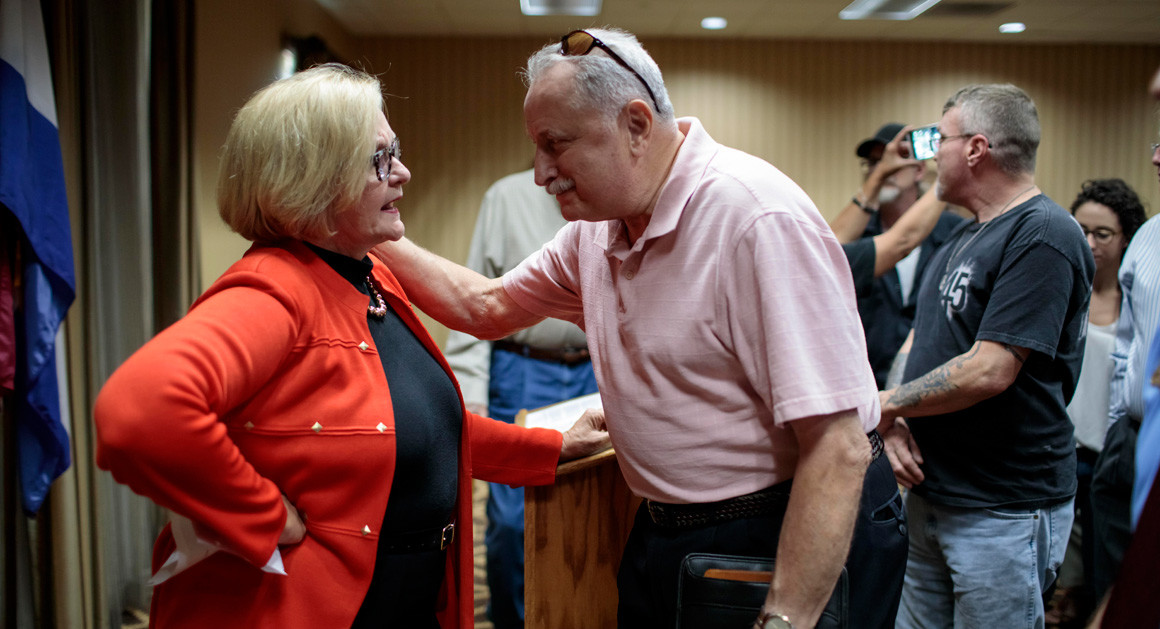Dissecting Democratic Senate Losses: Missouri Swing State No Longer By Luke Perry and Phillip Howard
Josh Hawley (R) defeated two-term incumbent Claire McCaskill (D) 51.5 percent to 45.5 percent in the 2018 midterm. Republicans outnumbered Democrats 663,553 to 605,503, but the two candidates were virtually tied in the polls.
As Chad Garrison from Politico wrote, “Missouri is a weirdly perfect microcosm of America’s geopolitical tribes.” This “makes no sense,” explained Dave Robertson, chair of Political Science at the University of Missouri-St. Louis, having “all these different groups and geographies” in one state.
Photo by Whitney Curtis/Politico
Missouri had been a bellwether for predicting presidential election outcomes, voting for the president in nearly every election for decades. In 2008, Missouri narrowly preferred John McCain over Barack Obama and has trended rightward since. Mitt Romney won by 9 points in 2012. Donald Trump doubled this in 2016.
McCaskill was swept into office in the 2006 Blue Wave and was aided in her 2012 reelection bid by Todd Akin’s “legitimate rape” comment. Hawley avoided damaging controversy, though Democrats attacked him for his position toward The Affordable Care Act, particularly “adding his name to a multi-state lawsuit that would have destroyed protections and undone much of the law.”
McCaskill was hampered by her low approval rating of just 37 percent, compared to 48 percent who viewed her unfavorably. While long seeking to connect with Missouri’s independent ethos, McCaskill “mostly stuck with Democrats in Washington this year.” For instance, McCaskill opposed President Trump’s signature legislation, The Tax Cuts and Jobs Act, and opposed of his Supreme Court nominees.
Hawley will be 39 years old when he takes office, making him one of the youngest Senators in Missouri and one the youngest current Senators. Hawley was a top GOP recruit, being a former Supreme Court clerk and law professor, but his campaign generated concern after a slow start.
Hawley’s “fire Claire” messaging ultimately found traction as he successfully connected McCaskill to Democratic leaders, Chuck Schumer and Nancy Pelosi, both of whom are deeply unpopular in the state. Hawley also criticized McCaskill’s opposition to President Trump, who is popular in Missouri and visited the state twice to support Hawley.
Photo by Charlie Riedel/AP
McCaskill’s last minute backing of Trump’s approach to the migrant caravan illustrated her concern about Trump’s influence, while generating backlash among Democrats, particularly more liberal, African-American voters in St. Louis and Kansas City. This speaks to the larger challenge for McCaskill, how a Democrat pursues victory in “a state that has substantial liberal, urban populations as well as rural and exurban swing voters who have moved toward the Republicans.”
This required McCaskill to walk “a tightrope, attempting to energize a progressive base and win over swing voters who may have voted for Trump.” With Hawley’s victory, “Republicans completed a rapid takeover of a onetime swing state and padded their majority in the Senate.”
Luke Perry (@PolSciLukePerry) is Chair and Professor of Government at Utica College.
Phillip Howard is a graduate student at Utica College







